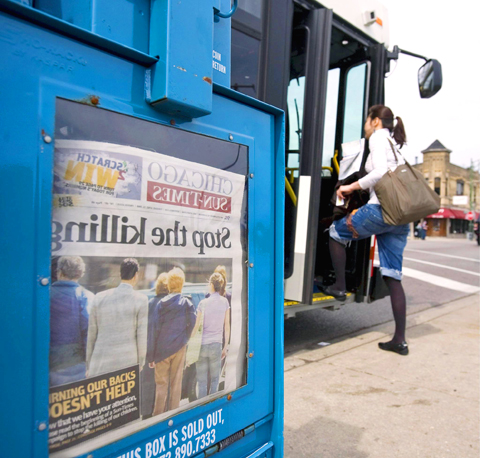After murder rates hit a 40-year low last year, Chicago is again in the grip of a wave of violence that has left dozens dead and forced parents to keep their children home from school for fear of stray bullets.
A weekend spree of violence that ended on Monday saw seven people killed in 36 separate shootings in just the latest bloodshed to draw calls for better gun control from city officials and community leaders.
And with more people out on the streets as warmer weather returns, police are worried the violence will only get worse.

PHOTO: EPA
Twenty-four of the city’s public school children have been slain since the academic year began in August; 21 of them were killed by shootings.
While just one was killed on school grounds — an 18-year-old boy shot to death in a parking lot on a Saturday afternoon — the violence in surrounding neighborhoods has created a climate of fear in the classrooms.
Parents and police are escorting students in high-risk housing projects to and from school in a program dubbed Operation Safe Passage, which began last month after gang violence escalated.
The city has tightened its curfew for teens and is even planning to deploy SWAT teams to help boost regular patrols.
Religious leaders have thrown open the doors of their churches and officials have expanded after-school programs to give children a safe place to play.
Community leaders and students have held rallies and vigils.
And yet the shootings have continued.
“We need to stop the killing right now,” said Reverend Walter Turner whose niece was shot on her way home from church just a few weeks ago.
Much of the violence has been limited to low-income and predominantly black and Hispanic neighborhoods on the city’s south and west side and can be traced to gangs.
But the Chicago Sun Times said it is time for the city’s wealthier residents to stop ignoring the violence just because they don’t hear the gunfire.
Borrowing the idea of a Colombian newspaper protesting the Revolutionary Armed Forces of Colombia (FARC) rebel movement, the paper reversed the type on its front page on Tuesday and ran a photo of the backs of a group of white people waiting to cross the street.
“We are trying to say to our fellow Chicagoans, in the most attention-grabbing manner we can, that turning our back on the violence killing our young people will not make it disappear,” the paper wrote in an editorial.
But even though the numbers may be down historically, they are still far too high, said Chicago Public Schools chief Arne Duncan.
While the root causes of the violence — social inequality, poor parenting, gangs and drugs — are complex, getting guns off the streets would dramatically reduce the death toll, Duncan said.
“We know the answer and that’s why it drives me crazy,” he said, calling gun violence a public health epidemic.
“What we’re lacking is political courage,” he said.

In the sweltering streets of Jakarta, buskers carry towering, hollow puppets and pass around a bucket for donations. Now, they fear becoming outlaws. City authorities said they would crack down on use of the sacred ondel-ondel puppets, which can stand as tall as a truck, and they are drafting legislation to remove what they view as a street nuisance. Performances featuring the puppets — originally used by Jakarta’s Betawi people to ward off evil spirits — would be allowed only at set events. The ban could leave many ondel-ondel buskers in Jakarta jobless. “I am confused and anxious. I fear getting raided or even

Kemal Ozdemir looked up at the bare peaks of Mount Cilo in Turkey’s Kurdish majority southeast. “There were glaciers 10 years ago,” he recalled under a cloudless sky. A mountain guide for 15 years, Ozdemir then turned toward the torrent carrying dozens of blocks of ice below a slope covered with grass and rocks — a sign of glacier loss being exacerbated by global warming. “You can see that there are quite a few pieces of glacier in the water right now ... the reason why the waterfalls flow lushly actually shows us how fast the ice is melting,” he said.

RISING RACISM: A Japanese group called on China to assure safety in the country, while the Chinese embassy in Tokyo urged action against a ‘surge in xenophobia’ A Japanese woman living in China was attacked and injured by a man in a subway station in Suzhou, China, Japanese media said, hours after two Chinese men were seriously injured in violence in Tokyo. The attacks on Thursday raised concern about xenophobic sentiment in China and Japan that have been blamed for assaults in both countries. It was the third attack involving Japanese living in China since last year. In the two previous cases in China, Chinese authorities have insisted they were isolated incidents. Japanese broadcaster NHK did not identify the woman injured in Suzhou by name, but, citing the Japanese

RESTRUCTURE: Myanmar’s military has ended emergency rule and announced plans for elections in December, but critics said the move aims to entrench junta control Myanmar’s military government announced on Thursday that it was ending the state of emergency declared after it seized power in 2021 and would restructure administrative bodies to prepare for the new election at the end of the year. However, the polls planned for an unspecified date in December face serious obstacles, including a civil war raging over most of the country and pledges by opponents of the military rule to derail the election because they believe it can be neither free nor fair. Under the restructuring, Myanmar’s junta chief Min Aung Hlaing is giving up two posts, but would stay at the